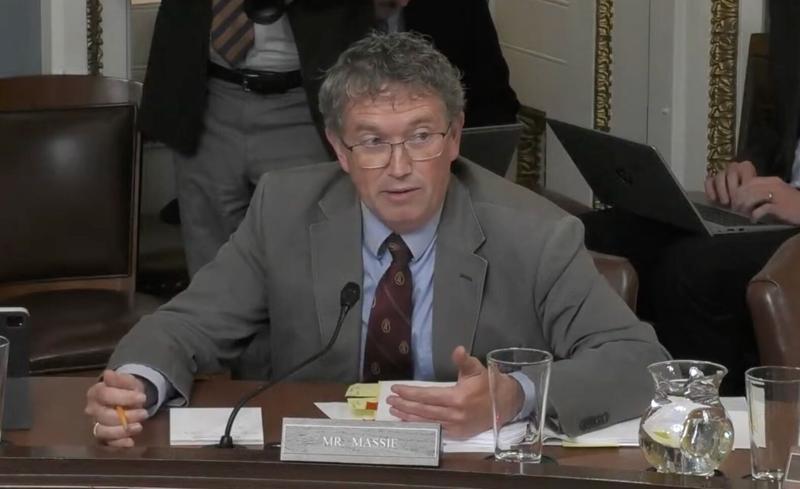Congress will keep passing temporary continuing resolutions to avoid a preventable government shutdown in bills members don’t read, U.S. Rep. Thomas Massie, R-KY, argues.
This will happen because “no one can stand to cut spending,” he said at a House Committee on Rules hearing on the Continuing Appropriations and Extensions Act, 2025.
The House and Senate Wednesday passed a temporary CR to fund the government through Dec. 20. The House passed it with 82 Republicans, including Massie, voting against it. The Senate passed it with only 18 Republicans voting against it. The CR would not have passed without Republican support.
Massie referred to a prediction he previously made that the SAVE Act, which the House passed in June, would be used as a bargaining tool to pass the CR but would later be stripped. After he made the prediction, it was stripped, the CR was pulled and reintroduced. He also said the SAVE Act, which would implement stronger measures to prevent noncitizens from voting, would not be signed into law.
“Three weeks ago, before the drama started, I said there would be some drama with the bright shiny object called the SAVE Act. I said that was going to get stripped off and you’re going to get a clean CR. I also predicted this would fall right before Christmas,” he said. Dec. 20 was picked as the deadline “because it’s the same reason we always have December 20th … it’s five days from Christmas and four days from Christmas Eve and you desperately want to be there with your family. This is when the leadership here has the maximum influence.”
This tactic applies to both parties, Massie said. “They love to pick the week before Christmas for this showdown because you can smell the jet fuel fumes over DCA. It smells like Christmas. You’re going to get to go home and open presents.” He described how the former House Speaker would tell members, “If you vote for this, you can go home and unwrap presents with your kids. If you don’t vote for this, you’re going to spend Christmas here with Nancy Pelosi. Then the chant starts, ‘vote, vote, vote, vote’” and members got “enthusiastic to vote for something they haven’t read.”
Congress could spend 12 months to work on 12 appropriation bills beginning on Oct. 1, when the fiscal year begins, he said, but won’t.
Instead, House and Senate leadership will push through CRs or omnibus bills to create a government shutdown and budget crisis before Christmas and in the spring, “whether it’s an omnibus that funds all of government with one bill,” or another CR, he said, it will pass again. It will be “written behind closed doors and every lobbyist in this town” will try to attach pork.
This has happened every year in the 12 years he’s been in Congress, he said. “It’s going to be the same old thing, warmed over, written behind closed doors, rolled out here. We’re not going to have time to read this thing.”
Before Dec. 20, leadership will pressure members “using their family, basically taking their Christmas hostage,” he said. “I think that’s wrong, and I don’t think we should do it.”
The funding proposals won’t last more than six months “because written into law signed by Joe Biden, voted for by Chuck Schumer, introduced by myself as a provision in law, it says if you go past April 30 on a continuing resolution you’re going to get an automatic 1% cut to everything that’s appropriated.
“The most responsible thing to do would be a one-year CR but nobody up here can stand a 1% cut to spending,” he said.
Congress has only passed required appropriations bills four times in recent fiscal years 1977, 1989, 1995, and 1997, according to a Pew Research Center analysis. It notes that the Congressional Budget Act of 1974 requires 12 separate appropriations bills to be passed.
A Congressional Research Service 2023 report explains the law also established April 15 as the deadline to adopt a budget resolution. “Congress has adopted a budget resolution prior to April 15 four times since FY1985, most recently for FY2004,” it says.
A 2018 Government Accountability Office report notes that Congress passed CRs 36 times in the most recent 40 years evaluated.






